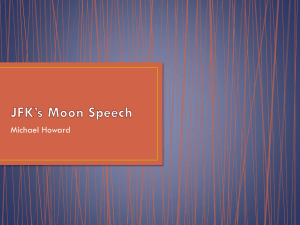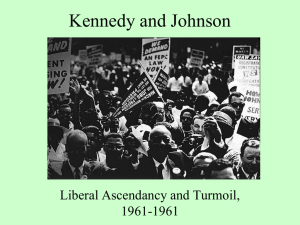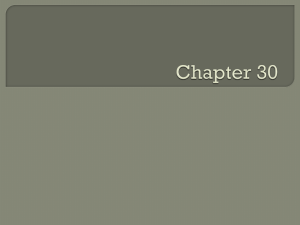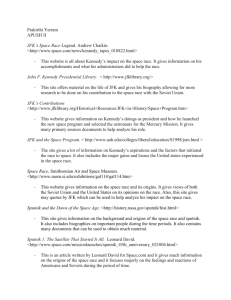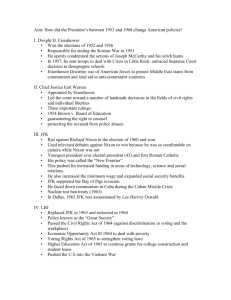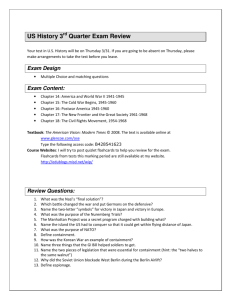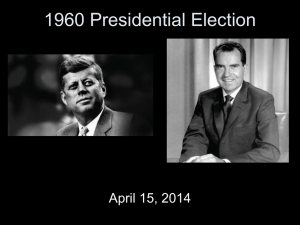The 1960 Election: Nixon vs. Kennedy
advertisement
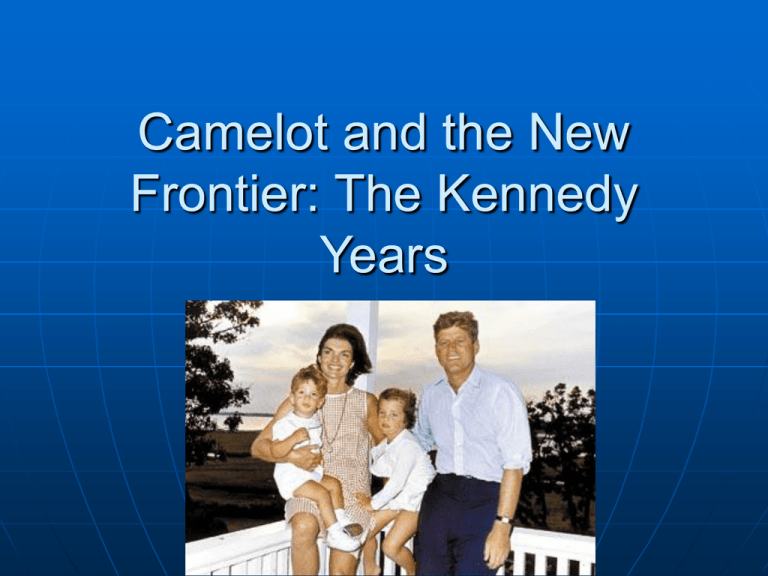
Camelot and the New Frontier: The Kennedy Years A presidential election that results in defeat of the party in power usually indicates the failure of the party in power to have dealt effectively with the nation’s problems, rather than indicating the positive appeal of the winning candidate and his party platform. Assess the validity of this generalization with reference to TWO of the elections in which the party in power was defeated: 1912, 1920, 1932, 1952, 1960, 1968. (80) Describe and account for changes in the American presidency between 1960 and 1975, as symbolized by Kennedy’s “Camelot”, Johnson’s “Great Society” and Nixon’s Watergate. In your answer, address the powers of the presidency and the role of the media. (03B) I. The 1960 Election: Nixon vs. Kennedy (after long, brutal primary between JFK + LBJ (including accusations of Addison’s and possibility of death in office)) The Issues: Foreign Policy Nixon: Contends that "American prestige is at an all-time high," thanks to the efforts of the Eisenhower administration. Kennedy: Citing a loss of prestige, declares that America needed a more activist and imaginative approach to international affairs. The Issues: Economy Nixon: Urges economic growth through a combination of private enterprise and individual initiative. Kennedy: Calls for increased government intervention to stimulate the economy. The Issues: Defense Nixon: Asserts that the U.S. has maintained military standing with the Soviet Union, and that military spending should be watched carefully for excess Kennedy: Argues that a "missile gap" favoring the Soviet Union makes an increase in defense spending necessary Issues: Other Kennedy’s Catholicism (servant to the Pope?) America’s spiritual and cultural malaise (indefinite feeling of uneasiness) JFK’s image = vigor, glamour, etc. Skillful in his use of media, especially TV (first televised debate: radio vs. TV) Election Results Hotly contested: very close • Kennedy wins by 113,000 out of 68 million cast Claims of voter fraud • Illinois, Texas Nixon publicly claims that he will not contest for “good of nation” • Has others file lawsuits, write articles, etc. • Pattern he (+ others) will use later in Presidency Swift Boat Vets for Truth AARP is gay-loving troop-haters Kennedy the Cold Warrior McCarthy era vision (Dems soft on communism) Kennedy über-Cold Warrior—stronger than Eisenhower (missile gap) Bay of Pigs and escalation in Vietnam • Would he have continued? “Let every nation know, whether it wishes us well or ill, that we shall pay any price, bear any burden, meet any hardship, support any friend, oppose any foe, in order to assure the survival and the success of liberty.” II. Soviet-American Tensions JFK an ardent Cold Warrior, but over time displayed caution/ pragmatism Alliance for Progress (LA Marshall Plan; “peaceful revolution”) & Peace Corps (1961) Build pro-USA nations in Third World + counterinsurgency (Green Berets) to defeat revolutionaries: Congo (1960+1), Brazil (1964; ITT and Joao Goulart; Nixon + ITT and Allende 1974) Few successes; aid goes through native elite resent attempt to impose US models JFK test ban to halt nuclear proliferation (1963) • JCS: test behind the moon Arms race accelerates: largest, fastest defense buildup in peace time • JFK increase nuclear weapons by 150% (1964) Accepts Berlin wall (1961) to avoid war: “a wall is a hell of a lot better than a war” • “I am a jelly donut!” But not really III. Bay of Pigs Invasion (1961) JFK cont. Ike’s plan for exile invasion Invasion quickly falters (no air support) Key: Cubans not support exiles • Compare Iraq In response, Castro moves closer to USSR JFK vow topple Castro • US seen as weak, anti-LA CIA’s Op Mongoose (sabotage, assassination) JCS plan for invasion IV. Cuban Missile Crisis (Oct. 1962) Castro: Soviet help deter US Khrushchev: missiles will deter invasion, improve USSR position in arms race (missile gap), improve USSR position LA When U-2 reveal missiles, JFK rejects quiet diplomacy demands removal of missiles Some suggest air strike; JCS want full invasion JFK: naval quarantine Announce it on TV; put military on high alert After days of brinkmanship, a compromise Secret deal: USSR remove Cuban missiles; USA pledge no invasion & remove Turkey missiles • Still debate on JFK’s actions during crisis: McNamara; JFK caused crisis; impact Vietnam After crisis, Test Ban Treaty (1963); hot line Tensions in Europe cool, but Cold War continue in arms race & Third World (Vietnam) • New book: Cuba JFK et.al. create theory of uberCommunists Papa Doc in Haiti, Trujillo in Dominican Republic V. Domestic Policies New Frontier: Reps & conservative Dems stall it in Congress (lack of mandate) JFK put less effort into domestic issues: pushed to Civil Rights by RFK BUT: extension Social Security, water pollution, expansion + increase min. wage, free trade, reform welfare (decrease dependence), Area Redevelopment, tax cuts (Keynesian demandside) Despite few legislative successes, JFK able to inspire idealism (Peace Corps, moon mission) Assassination Johnson, CRM, Great Society (achievement Kennedy goals +)
